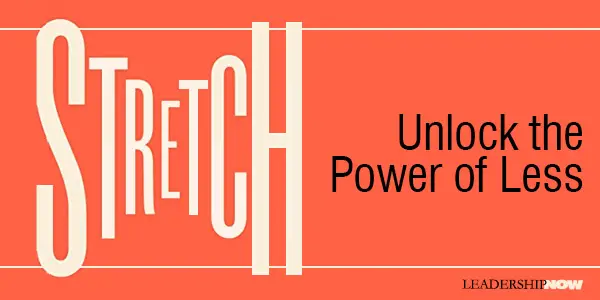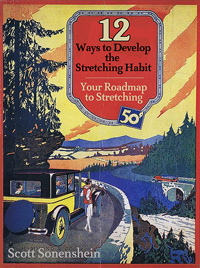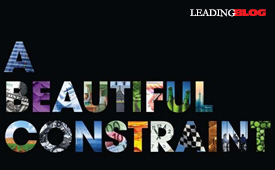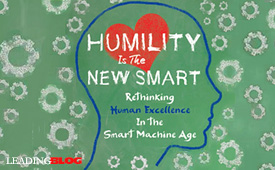
Stretch: Unlock the Power of Less

I
N HIS BOOK
Stretch, Scott Sonenshein dispels the notion that having
more resources = getting better results and replaces it with the conviction that a
better use of resources = getting better results.
We are under more pressure than ever to do more. The idea that we can stretch and do more with what we already have begins to remove us from the dehumanizing rat race for resources that is impossible to win. Chasing limits us. Stretch liberates.
Especially in uncertain times, “stretching equips us with the abilities to adapt and change when facing a less predictable set of circumstances.”
One of the reasons we chase instead of stretch is because fail to see how we might see a resource beyond its traditional use. It’s also easy to assume that if we just had more money we could spend our way out of our problems. It’s often easier to acquire things than to think about how to use those same resources in more productive ways. “The problem is that chasers become so fixated on acquiring resources that they lose sight of what those resources will do for them” so we end up squandering them.
We need to place more focus on what we already have. “Stretchers find beauty and richness in places where others struggle to see anything of value. Too often, we understand, interact with, and use things at face value, locking ourselves into conventions that limit possibilities.” Our creativity is sparked by constraints. Filmmaker Robert Rodrigues comments:
The creative person with limitless imagination and no money can make a better film than the talentless mogul with the limitless checkbook every time. Take advantage of your disadvantages, feature the few assets you may have, and work harder than anyone else around you.
Outsiders can often stretch by seeing possibilities that we can’t because we are the expert or just too close to the issue. “Breadth of experiences helps people stretch.” The well rounded often outperform those who are deeply focused on a single thing especially when trying to solve complex problems. It makes a case for a liberal arts education.
We need to repeatedly go outside ourselves. “Temporary departures from our small worlds can come from short bursts of new activities such as reading about another field, finding a hobby, or having conversations with people from different backgrounds.”
Stretching is not about being a cheapskate. There is a difference between frugal and cheap.
A Stretching Roadmap
In summary, here are a dozen ways Sonenshein suggests to help get us into the stretching habit.
Just Say No
Just say no to more resources. Ask: “If I only didn’t have these resources, I could…” “By saying no to more resources, we’re saying yes to an entirely new outlook on working and living.”
Find a Sleeping Beauty
It’s easy to miss what is right before us. Again an outsider can help here. “In the world beyond fairy tales, a lot of resources lie dormant. If we look hard enough, we’ll find resources all around us waiting to be activated. We just need to awaken them to benefit from more than we thought we had, allowing us to solve different problems and pursue promising opportunities that otherwise might be impossible.”
Go Explore
Dedicate time every week to reading something different, educate yourself outside of your industry, take lunch with someone new, or spend time with outsiders. Leave your comfort zone.
Take a Break (and Pay Less Attention)
Consider rotating between difficult work and mindless work. “Mindless work recharges our batteries, readies us to do more down the road, and lets our mind wander to find new connections among our resources.” Take a walk to find new connections. Consider putting yourself on the clock to provide a mandatory beginning and ending to your work.
Pick New Neighbors
“Whom we spend time with shapes a lot of our behavior.” You don’t need to change zip codes. “Instead, identify one stretcher you admire and already know. Commit to spending at least one hour with him or her once a month.”
Appreciate
“When people are grateful, they expand how they think about resources, often in ways that try to help others.” Also, by appreciating what we have, it makes it easier to say no to tempting things we lack but really don’t need.
Shop Your Closet
Use what you have. “Many of the best-known inventions came from existing products. Play-Doh started as a wallpaper cleaning compound that became obsolete with the rise of vinyl wallpaper in the 1950s; the corkscrew came from a military tool to remove bullets; and Pyrex came from material from train lantern glass the wife of a scientist at Corning Glass Work experimented with to bake a cake.”
Plan Backward
Think improvisation. Without a plan is often difficult to get started. But “jazz music replaces a plan with improvisation, teaching us to act and respond more spontaneously. Once we get moving, we free ourselves from worrying about plotting and following a plan and focus on observing and learning from our actions.”
Scramble the Back Row
To remove chess players from entrenched thinking, Bobby Fischer suggested randomly scrambling the back row. “If we find ourselves too regularly on autopilot, it might be time to scramble our back rows. There’s comfort in habits, but it’s critical to avoid being complacent with how things are, closing off the possibility of imagining how things might be better.”
Make Midyear Resolutions
“Why wait until the beginning of the year to make a pledge. The midyear resolutions also allow us to take stock of how we did with our New Year’s resolutions and set additional goals from a presumably clearer headspace.”
Break it Down
If we can break down our resources to their smallest components, then it becomes easier to see the hidden potential.
Turn Treasure into Trash
Keep a benefits diary to records unexpected benefits from you key events, activities, or experiences. “Once we find a hidden benefit in something, we can turn it into a treasure.
Stretch is a very well done book. Good and relevant examples give power to the points he is making. By chasing resources we really limit our potential. Stretching brings out our best.

 | | | In Stretch: Unlock the Power of Less - and Achieve More Than You Ever Imagined, you will learn to rethink what you need to succeed, and do more with what you already have. Scott Sonenshein examines why some people and organizations succeed with so little while others fail with so much. |
|
* * *

Like us on
Instagram and
Facebook for additional leadership and personal development ideas.
* * *




Posted by Michael McKinney at 05:55 PM
Permalink
| Comments (0)
| This post is about Management
, Personal Development
, Problem Solving











